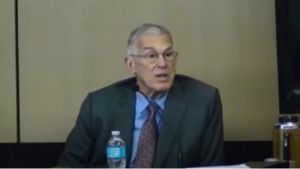

The Expert: Dr. William Klein, a pulmonologist out of California testifies for the defense regarding the plaintiff’s COPD.

Giving testimony for the defense in a 2016 tobacco trial out of Palm Beach County, Florida, Dr. William Klein, a California pulmonologist, expresses his expert opinion regarding the claim by a plaintiff that the defendant cigarette maker was responsible for his chronic obstructive pulmonary disease (COPD). The defendant in this case countered that the plaintiff had the respiratory disease before the date allowable to file a claim under the class action lawsuit, and thus the claim against it was time-barred.
Klein initially explains that COPD is a slowly progressing disease that begins as a mild phase and progresses to moderate, severe, then very severe over a period of decades. It is an insidious disease that can progress without the victim being aware of this progression. Patients do not generally notice when they are in the early stage of the disease, so they do not become aware of the magnitude of their problem until they become short of breath with activity.
The doctor explains that there are four stages of COPD according to the Gold Criteria. The first and earliest stage carries a hacking cough, sometimes accompanied by wheezing. This can be accompanied by very mild shortness of breath, which may not be noticeable to the patient. After progressing to the second stage, a COPD patient develops definite, notable shortness of breath with exertion. Those with stage 3 are considered to have severe disease and exhibit shortness of breath with minimal exertion. Finally, those with stage 4 have very severe disease and are short of breath at rest.
The expert explains how lung function naturally deteriorates in all individuals starting at age 35 or 40. However, smokers lose lung function at an accelerated rate. Using an easy-to-understand chart drawn in court, he portrays the loss of lung function over time in nonsmoking men and women. There is a much sharper decrease in lung function in smokers, and if they stop smoking, they will over a few years’ time, begin losing function again at the same rate as nonsmokers their age and sex. Unfortunately their baseline loss of lung function has already permanently been reset to their detriment. If the smoker continues to smoke, the sharper decrease in functional lung loss continues at the original accelerated rate. The nonsmokers’ rate of normal loss of functional lung is between 20-40 cc per year, whereas the smokers’ rate of loss of functional lung is 60cc per year.
Klein states that, although the timing can be variable, it usually takes about ten years to progress to Stage 3 COPD. Stage 4 then occurs “fairly fast” from there. Although patients can notice that their symptoms are worsening and becoming more persistent, frequently it will be more obvious to their friends who will observe this and tell them.
In reviewing this particular case, the expert pinpoints times from the late 1970s and early 1980s when the plaintiff was in his 30s and 40s, that friends and relatives noted his chronic cough and shortness of breath, pointing it out to him. He concludes that the plaintiff was in Stage 1, experiencing airway obstruction in the 1980’s as manifested by chronic coughing, and then once he became short of breath, he had entered stage 2. Klein states, “The British definition of chronic bronchitis is chronic cough and sputum production on a daily basis for three months of the year for at least two years in a row. He clearly made that.” This authoritative and easily understood testimony pinpointing when this disease started in the plaintiff, was pivotal in the jury’s finding for the defense.
Gary Gansar, MD, is residency-trained in general surgery. He served as Chief of Surgery and Staff at Elmwood Medical Center and on the Medical Executive Committee at Touro Infirmary and Mercy Hospital in New Orleans, LA. Dr. Gansar was Board Certified in general surgery while in active practice. He joined AMFS in 2015 as a Physician Medical Director.
The medical expert witness partner for attorneys serious about building a winning case
AMFS is your trusted source for highly-qualified medical expert witnesses. After pioneering the field nearly three decades ago, we’re continuing to redefine medical expert witness services by providing value far beyond a referral alone.
Our Physician Medical Directors know what it takes to build a strong case. Our medical expert witnesses leave no doubt. And our case managers streamline billing and logistics every step of the way, letting you focus on what you do best: constructing your winning case. Explore why AMFS clients expect more from their medical expert witnesses—and get it.
